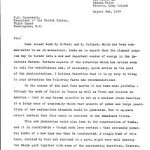 If you pay any attention to what’s going on in the American political arena, you probably know that the term “earmark” doesn’t refer to “a small area on the surface of the organ of hearing and balance in humans having a different color from its surroundings.”
If you pay any attention to what’s going on in the American political arena, you probably know that the term “earmark” doesn’t refer to “a small area on the surface of the organ of hearing and balance in humans having a different color from its surroundings.”
 No, it’s commonly considered synonymous with “pork barrel” legislation, the derogatory term referring to appropriation of government spending for localized projects secured to bring money into a politician’s district. Although the terms are not necessarily the same, they share two things in common: politicians love them (even when they vote against them), and they operate like a cancer in the
No, it’s commonly considered synonymous with “pork barrel” legislation, the derogatory term referring to appropriation of government spending for localized projects secured to bring money into a politician’s district. Although the terms are not necessarily the same, they share two things in common: politicians love them (even when they vote against them), and they operate like a cancer in the  budgetary process because they eat away at the core of fiscal responsibility by serving as the legal tender for exercising power in Congress.
budgetary process because they eat away at the core of fiscal responsibility by serving as the legal tender for exercising power in Congress.
One aspect of these deplorable shenanigans that elevates my blood pressure is the common practice of using legislation having nothing to do with the purpose of the earmark as the greased tongue depressor upon which to ram the expenditure down the throats of those few Americans who actually hand over their hard-earned money so politicians can play with it.
This is especially true of the defense appropriations bill, which has enough problems of its  own without being held hostage to special interests. Congressmen know the bill is going to be passed, (we can’t leave our troops without bullets, now can we?), so they attach the products of their pet agendas to improve the chances of funding them.
own without being held hostage to special interests. Congressmen know the bill is going to be passed, (we can’t leave our troops without bullets, now can we?), so they attach the products of their pet agendas to improve the chances of funding them.
The mid-term elections have provided a backdrop for observing how duplicitous the process really is. A recent NYT article by Ron Nixon observes that in the face of a looming ban on earmarks, lawmakers will not be deterred from business as usual.
 Nixon: “No one was more critical than Representative Mark Steven Kirk when President Obama and the Democratic majority in Congress sought passage last year of a $787 billion spending bill intended to stimulate the economy. And during his campaign for the Illinois Senate seat once held by Mr. Obama, Mr. Kirk, a Republican, boasted of his vote against ‘Speaker Pelosi’s trillion-dollar stimulus plan’. Though Mr. Kirk and other Republicans thundered against pork-barrel spending and lawmakers’ practice of designating money for special projects through earmarks, they have not shied from using a less-well-known process called lettermarking [emphasis added] to try to direct money to projects in their home districts.”
Nixon: “No one was more critical than Representative Mark Steven Kirk when President Obama and the Democratic majority in Congress sought passage last year of a $787 billion spending bill intended to stimulate the economy. And during his campaign for the Illinois Senate seat once held by Mr. Obama, Mr. Kirk, a Republican, boasted of his vote against ‘Speaker Pelosi’s trillion-dollar stimulus plan’. Though Mr. Kirk and other Republicans thundered against pork-barrel spending and lawmakers’ practice of designating money for special projects through earmarks, they have not shied from using a less-well-known process called lettermarking [emphasis added] to try to direct money to projects in their home districts.”
 Okay, so to get some wiggle room for attacking political opponents, they’ll eschew the onerous earmarks (publicly, at any rate), and mark letters instead. How does that work, exactly? Nixon goes on to tell us: “Mr. Kirk, for example, sent a letter to the Department of Education dated Sept. 10, 2009, asking it to release money ‘needed to support students and educational programs’ in a local school district. The letter was obtained under the Freedom of Information Act by the group Citizens Against Government Waste, which shared it with The New York Times. The district, Woodland School District 50, said it later received about $1.1 million in stimulus money. In response to questions about the letter, a
Okay, so to get some wiggle room for attacking political opponents, they’ll eschew the onerous earmarks (publicly, at any rate), and mark letters instead. How does that work, exactly? Nixon goes on to tell us: “Mr. Kirk, for example, sent a letter to the Department of Education dated Sept. 10, 2009, asking it to release money ‘needed to support students and educational programs’ in a local school district. The letter was obtained under the Freedom of Information Act by the group Citizens Against Government Waste, which shared it with The New York Times. The district, Woodland School District 50, said it later received about $1.1 million in stimulus money. In response to questions about the letter, a  spokeswoman for Mr. Kirk defended the practice of reaching out to federal agencies to secure financing for constituents. ‘Senator-elect Kirk became the first member of the Appropriations Committee to stop requesting earmarks and voted against the stimulus bill,’ the spokeswoman, Susan Kuczka, said in a prepared statement. ‘He has and will continue to be an advocate for his Illinois constituents before administration agencies but will not request Congressional earmarks to be included in House or Senate legislation.'”
spokeswoman for Mr. Kirk defended the practice of reaching out to federal agencies to secure financing for constituents. ‘Senator-elect Kirk became the first member of the Appropriations Committee to stop requesting earmarks and voted against the stimulus bill,’ the spokeswoman, Susan Kuczka, said in a prepared statement. ‘He has and will continue to be an advocate for his Illinois constituents before administration agencies but will not request Congressional earmarks to be included in House or Senate legislation.'”
Aha. It turns out that lettermarking takes place outside the Congressional appropriations process and is one of the many ways legislators who support a ban on earmarks try to direct money back home. But that’s not all . . .
 Nixon: “In phonemarking [emphasis added], a lawmaker calls an agency to request financing for a project. More indirectly, members of Congress make use of what are known as soft earmarks [emphasis added], which involve making suggestions about where money should be directed, instead of explicitly instructing agencies to finance a project. Members also push for increases in financing of certain accounts in a federal agency’s budget and then forcefully request that the agency spend the money on the members’ pet project.”
Nixon: “In phonemarking [emphasis added], a lawmaker calls an agency to request financing for a project. More indirectly, members of Congress make use of what are known as soft earmarks [emphasis added], which involve making suggestions about where money should be directed, instead of explicitly instructing agencies to finance a project. Members also push for increases in financing of certain accounts in a federal agency’s budget and then forcefully request that the agency spend the money on the members’ pet project.”
Although these methods sidestep the regular process and are are harder to track, a NYT review of letters and emails to government agencies from members of Congress showed that the practice is widespread in spite of executive orders instructing agencies not to finance projects based on communications from Congress.
 Legislators have a history of finding new ways to get money for their districts. David E. Williams, vice president for policy at Citizens Against Government Waste, likened the effort to stamp out earmarks to a game of “Whack-a-Mole.” Williams: “When one door closes, there [are] always two or three more that they can go through.” He fears that lawmakers will develop even less transparent ways to finance their special projects.
Legislators have a history of finding new ways to get money for their districts. David E. Williams, vice president for policy at Citizens Against Government Waste, likened the effort to stamp out earmarks to a game of “Whack-a-Mole.” Williams: “When one door closes, there [are] always two or three more that they can go through.” He fears that lawmakers will develop even less transparent ways to finance their special projects.
Congressional opponents of earmarks see merit in banning them even as they admit there is no way to stamp them out, and like to emphasize that lettermarking and phonemarking are not legally binding on the agency being “marked.” Maybe not, but Winston Wheeler, a former Senate appropriations and national security aide who worked for both Democrats and Republicans over three decades before stepping down in 2002, said agencies were loath to ignore requests from legislators, especially appropriators. Wheeler: “When you have people who control your budget, that you have to appear before on an annual basis to ask for funding, you listen to what they have to say.”
 Patrick M. Cronin, a senior adviser at the Center for New American Security and a former administrator at the Agency for International Development, said soft earmarks were commonly used by members of Congress, especially appropriators. Cronin: “They would tell you that they wanted money to go to a particular university or group or the next time you wouldn’t get the funding in the budget you wanted. So it’s true that you can ignore some soft earmarks, but others you have to take more seriously. Agency heads are not going to put their budgets in jeopardy because of a few line items.”
Patrick M. Cronin, a senior adviser at the Center for New American Security and a former administrator at the Agency for International Development, said soft earmarks were commonly used by members of Congress, especially appropriators. Cronin: “They would tell you that they wanted money to go to a particular university or group or the next time you wouldn’t get the funding in the budget you wanted. So it’s true that you can ignore some soft earmarks, but others you have to take more seriously. Agency heads are not going to put their budgets in jeopardy because of a few line items.”
Sounds like blackmail to me.
 And how about the fact that military spending bills regularly contain financing that the Pentagon did not seek for projects in Congressional districts. Steve Ellis of Taxpayers for Common Sense, a nonpartisan group that tracks federal spending, refers to such financing as “undisclosed earmarks.” These expenditures end up in a bill at the request of lawmakers or military contractors, but the source of the request does not have to be disclosed because the provisions do not meet the Congressional definition of an earmark. Spending bills for 2010 contained 146 such subterranean porkers totalling nearly $6 billion.
And how about the fact that military spending bills regularly contain financing that the Pentagon did not seek for projects in Congressional districts. Steve Ellis of Taxpayers for Common Sense, a nonpartisan group that tracks federal spending, refers to such financing as “undisclosed earmarks.” These expenditures end up in a bill at the request of lawmakers or military contractors, but the source of the request does not have to be disclosed because the provisions do not meet the Congressional definition of an earmark. Spending bills for 2010 contained 146 such subterranean porkers totalling nearly $6 billion.
 Ellis: “If it walks like a duck and quacks like a duck, it’s a duck. These are clearly earmarks.”
Ellis: “If it walks like a duck and quacks like a duck, it’s a duck. These are clearly earmarks.”
To paraphrase: If it waddles like a pig and it oinks like a pig, it’s clearly pork.
Next thing you know, they’ll try to tell us a sow in a silk dress is beautiful.


